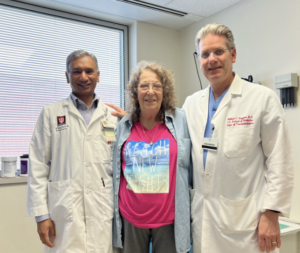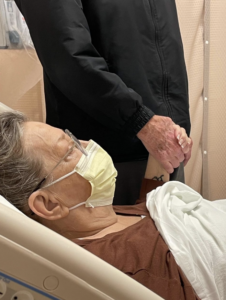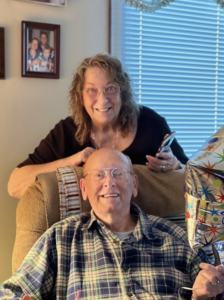Local 81-Year-Old Talks Life After Kidney Transplant
Writer & Photographer / Melissa Gibson
In 2018, Jane Burgan wasn’t feeling well, sought out a doctor, and heard some terrible news.
“The doctor said, ‘You’re in deep trouble. You’re in kidney failure,’ and sent me directly to dialysis that same day,” Burgan says.
Burgan’s daughter, Nora Day, has been with her every step of the way.
“She started dialysis on my 50th birthday and even crashed during dialysis,” Day says. “We were told in 2001 that she had kidney problems, but the doctor described it as when someone has a heart attack – it’s an instant thing. When someone has kidney failure, it’s a slow process. When it finally hits you, it’s usually too late.”
Desperate for a kidney, she went to St. Vincent Hospital, but staff told the family Burgan was simply too old to qualify.
Burgan was in her late 70s at the time, and despite the wonderful staff at the dialysis center, DaVita, the treatment was hitting her hard. The family didn’t take no for an answer.
They went to IU Health, and the transplant staff there thought Burgan might have a chance.
“They check you from head to toe to make sure you’re healthy,” Day says. “Mom had to have both knees replaced, cataract surgery, dental work, MRIs, chest X-rays, the works. Everything has to be done in a year’s time, and meanwhile the pandemic hits and appointments are delayed. Some of the tests she’s already done are falling off for the time frame.”
Tests had already shown that Day and Burgan are not a match, but a program through IU Health called paired donation was available. In theory, the kidneys are switched at the same time, from two donors to two recipients.
It didn’t quite turn out that way.
While Burgan waited for the perfect match, Day was able to donate her kidney in advance, pushing her mom higher on the list of potential recipients.
“The typical wait time for a kidney is five years, but I don’t think mom would have made it that long on dialysis,” Day says. “I donated mine in September of 2021. The benefit of that would be that I was healed by the time mom got hers, and I could care for her during her recovery.”
Once Day was healed, the family had to wait for a donor, either living or deceased, that matched Burgan.
It took another seven months for Burgan to get the call.
“On December 1, 2022, I got the phone call,” Burgan says. “It was shocking. I’d waited so long and prayed for so long and the nurse said, ‘I’ll give you 20 minutes to talk to your family.’ I was up at IU by 10:30 that night, and was in surgery by 7:30 in the morning.”
Her donated kidney was a perfect match, and though the typical kidney donated is approximately 71 years old, this one was 50 years old.
Burgan’s family completely understood the pain another family was going through in order for their mom to regain her health.
“I’ve lost a son and I know the horrific grief that comes with that loss,” Day says. “In a letter to the family, I told them their loved one was a hero in our hearts and eyes. It was heartbreaking to know that someone is grieving, and we grieved and prayed for that family that saved my mom. At the same time, we couldn’t turn down this opportunity. There were a lot of mixed feelings.”
 The doctor who performed the transplant said in his 20-year career, including more than 3,000 transplants, the oldest recipient was around 78. It was a rare and special occasion that Burgan, then 80, was able to receive this gift.
The doctor who performed the transplant said in his 20-year career, including more than 3,000 transplants, the oldest recipient was around 78. It was a rare and special occasion that Burgan, then 80, was able to receive this gift.
In fact, he said he could count on less than one hand how many surgeries he had performed for a patient around her age.
She was a unicorn, Day told her.
“As soon as she was out of surgery, they told us the kidney was already working,” Day says. “All glory to God. Some people don’t have an immediate reaction, so this was great news.”
The recovery for both the living donor and the recipient isn’t easy.
Day compares it to taking a healthy person and making them very sick. It took about three months before she was back to sound health.
Burgan had some additional challenges.
“I was in the hospital for seven days and home for five,” Burgan says. “Then I went back in for another six days. It takes determination and you have to have true grit, but I signed up for it and it was a job I had to do. I was going to do it.”
Now 81, Burgan had to drink four liters of water per day, adhere to a careful diet, and was spending days at a time at follow-up appointments.
“I still tire easily and take naps,” Burgan says. “They say it’ll be about six months to get back to 100%.”
She still has a couple of months of restrictions including no driving, cleaning, cooking or physical exertion, but Day can see the signs of things to come.
“I drove around the corner the other day and saw her sitting outside, planting flowers,” Day says. “It feels good. It’s the first time she’s been outside and things have finally come full circle. We’re getting there.”
The family says the doctors at IU Health were phenomenal, from Nephrologist Dr. Muhammad Yaqub to Transplant Surgeon Dr. William Goggins.
“God led me in the right direction when I went to IU Health,” Burgan says. “I had so many doctors and they were the absolute best.”
Burgan has plenty to fight for too.
“I have 13 great-grandbabies,” she says. “Ten are under 5 years old. My husband Bill has been by my side for 48 years and we have six kids between us. They say you have angels around you, and I called on them more than once, and still do. I’ve made it with God’s help.”
The family hopes to spread the word about organ donation, and just how those who receive an organ have their lives saved and transformed.
“I hope people will feel proud to sign up for organ donation,” Day says. “I don’t know if they know the difference their loved one brings to the recipient’s family. We hope to reach out to the donor’s family very soon and we’re just so grateful for all the people who have touched our lives during this journey. We had unconditional love from neighbors. Friends would take mom to doctors appointments so I didn’t have to miss work, and many brought meals. The doctors, nurses and staff have been gifts from God.”
brings to the recipient’s family. We hope to reach out to the donor’s family very soon and we’re just so grateful for all the people who have touched our lives during this journey. We had unconditional love from neighbors. Friends would take mom to doctors appointments so I didn’t have to miss work, and many brought meals. The doctors, nurses and staff have been gifts from God.”
According to IU Health, there are 115,000 people in the U.S. waiting on a transplant today. About 22 of those will die every day because of transplant unavailability.
One donor can save up to eight lives, and heal up to 75 people with cornea and tissue donation.
To learn more about organ donation, visit iuhealth.org.





